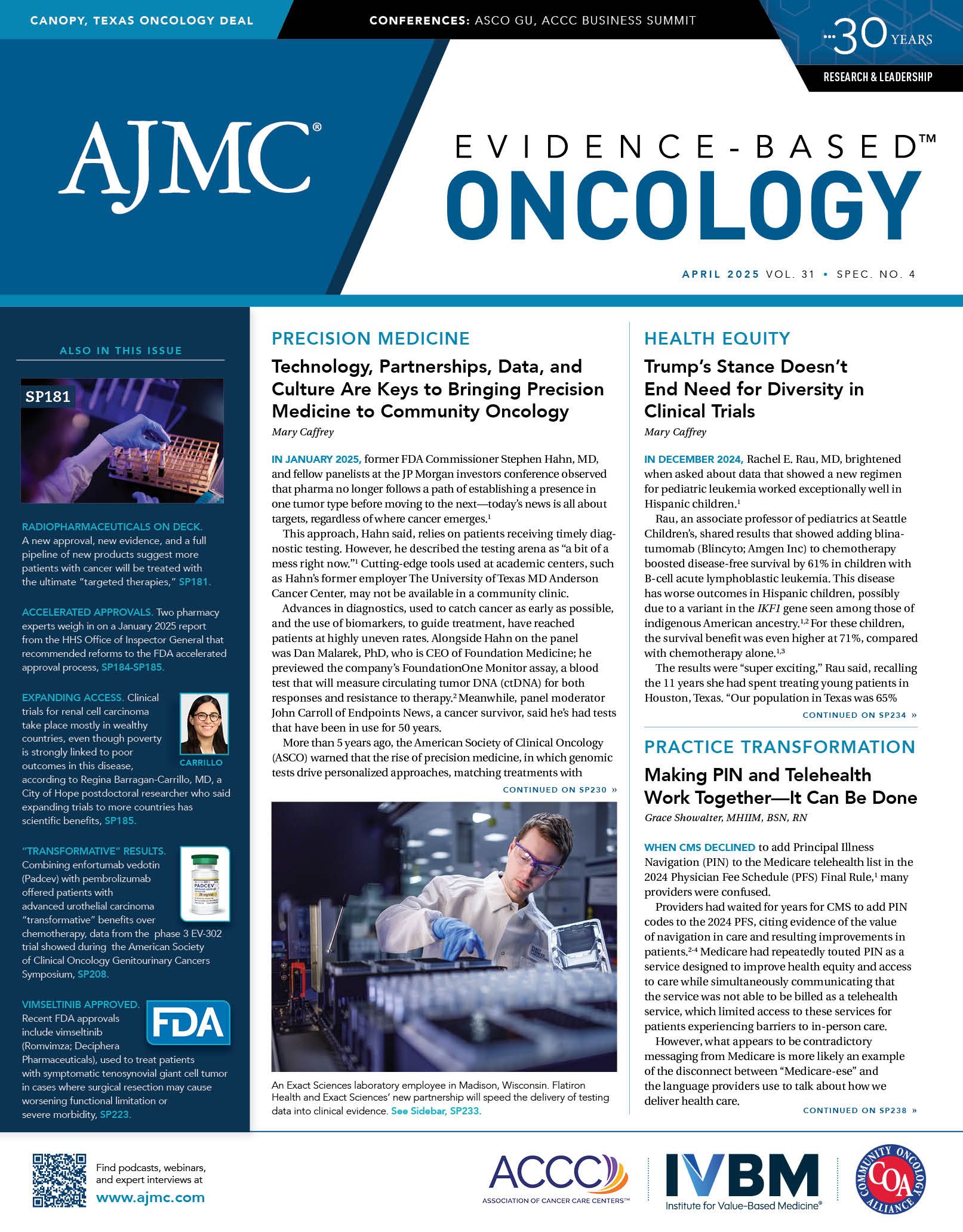- Center on Health Equity & Access
- Clinical
- Health Care Cost
- Health Care Delivery
- Insurance
- Policy
- Technology
- Value-Based Care
Price Caps During Accelerated Approval Would Help Address Financial Toxicity for Patients, Jensen Says
Health care institutions with large numbers of Medicare and Medicaid patients may be constrained from offering cancer therapies made available under the accelerated approval pathway.
A recent report from the HHS Office of the Inspector General (OIG) addressed challenges with the current accelerated approval pathway, which was created in 1992 to offer patients a way to gain access to novel therapies ahead of final results of a phase 3 trial.1
Although the report released January 14, 2025, was triggered by events surrounding approval of aducanumab (Aduhelm; Biogen) for Alzheimer disease, its scope and recommendations spoke to the widespread use of the accelerated pathway in oncology. A 2024 presentation at the American Association for Cancer Research annual meeting found that 59 cancer drugs received approval under the accelerated pathway from 2013 to 2023.2 The HHS OIG report highlighted instances where drugs stayed on the market for years at full price while confirmatory trials were delayed; some of these drugs were pulled from the market when follow-up trials failed to confirm the early benefit.1
Chelsee Jensen, PharmD, BCPS | Image credit: LinkedIn

In its report, HHS OIG recommended that FDA “strengthen guardrails in certain circumstances to ensure appropriate and consistent use of the accelerated approval pathway.” It called for 2 specific steps:
- FDA should “define specific factors that would require FDA’s accelerated approval council to advise on certain drug applications.” The agency did not agree with this recommendation, although the internal council has met several times.
- FDA agreed that it should “take steps to ensure that appropriate documentation of meetings with sponsors is included in drug approval administrative files.”1
For insight on the implications of the report and its recommendations in clinical practice, The American Journal of Managed Care® (AJMC®) spoke with Chelsee Jensen, PharmD, BCPS, director of formulary management at Mayo Clinic. Jensen cited the example of July 2021 safety alert of melphalan flufenamide (Pepaxto) to treat multiple myeloma, coming just after the accelerated approval; this was followed by FDA’s final decision under the process spelled out in the Food and Drug Omnibus Reform Act of 2022.3
AJMC: The HHS OIG report on the accelerated approval pathway discussed use of an Accelerated Approval Coordinating Council, which met 3 times during 2024. What are your thoughts on the usefulness of having this council as an internal mechanism?
Jensen: I do think it is useful to have some sort of council as an internal mechanism. The bottom line is really we need accountability to track outcomes on accelerated approval agents to ensure confirmatory trials are being completed in a timely manner. I'm not exactly sure if it was that Accelerated Approval Coordinating Council or the OCEAN investigators, but I do think it was really good that the safety signals for melphalan flufenamide were caught in a timely manner in order to facilitate its removal from the market.
Melphalan flufenamide was approved in February of 2021,4 the OCEAN trial FDA safety alert came out in July of 2021,5 and it was withdrawn from the market in October of 2021, so I think that was a very timely time frame in order to address those safety signals and get that off the market.
AJMC: What challenges do clinicians face when they have started a patient on a cancer drug that was approved through the accelerated process, and then the therapy is pulled off the market?
Jensen: I have not had direct patient conversations about this, but I have heard that these conversations are very difficult, especially when an accelerated approval agent is withdrawn and a patient's on it and responding. With those patients, you have to have a difficult conversation of, can we continue the therapy? Sometimes there's a venue through a compassionate use program, but other times there is not. Getting that patient onto a different drug altogether, whether there's a drug available in that line of treatment, has to be a difficult conversation. In addition, I have seen recent trends that sometimes commercial insurance will not even cover accelerated approval drugs because these therapies are considered investigational. So, it's still unclear for those patient populations whether they would have a venue to access the drug through a clinical trial, or whether they would have access at all. I think that's an interesting trend that needs to be followed, especially if we continue to see an increase in certain commercial insurers not covering drugs under accelerated approval.
AJMC: One challenge has been the length of time that has occurred in some cases, between the accelerated approval—when the drug enters the marketplace—and when the confirmatory trial happens. This is an issue that the OIG report did highlight; the report noted how much money Medicare and Medicaid have spent on some of these drugs under accelerated approval. Should Congress authorize Medicare and Medicaid to perhaps pay less for these drugs, or authorize an assessment on the pharmaceutical companies that take too long to complete confirmatory trials?
Jensen: While I do think the penalty obviously would offset cost CMS directly, it really does not address that financial toxicity that patients might incur, that health care institutions might incur, and other insurance companies may incur for offering an accelerated approval drug. I personally do feel it would be a better path for Congress to set price limits for accelerated approval drugs, limiting them to $150,000 to $200,000 annualized wholesale acquisition cost. In my opinion, the price cap should be in place for the duration of its accelerated approval. And once it does get granted full approval, then [pharmaceutical companies] would be authorized to adjust the price as they see fit. But I really do think that we need to have more price controls on the front end in order to reduce financial toxicity to patients and to that health care institution as a whole.
AJMC: Is there anything else you would like to add?
Jensen: Often, when we do have a drug that's coming to market, the manufacturer is not going to offer a health care institution a discount on that drug. Yet, they might be aggressively discounting it to certain insurance companies to maintain formulary status. Again, if the population served by the institution is heavily [enrolled in] Medicare and Medicaid, it may not be financially feasible for that institution to offer the medication without taking a significant loss. That’s why I do think a pricing limit on the front end for accelerated approval drugs would be more impactful and equitable to the system vs reimbursement limits or a penalty.
References
- Office of the HHS Inspector General. How FDA used its accelerated approval pathway raised concerns in 3 of 24 drugs reviewed OEI-01-21-00400. HHS. January 2025. Accessed January 14, 2025. https://oig.hhs.gov/documents/evaluation/10160/OEI-01-21-00400.pdf
- Matthius A. Accelerated approval of cancer drugs: how many verify clinical benefit? American Association of Cancer Research. April 8, 2024. Accessed February 24, 2025. https://www.aacr.org/blog/2024/04/08/accelerated-approval-of-cancer-drugs-how-many-verify-clinical-benefit/
- FDA issues final decision on withdrawal of Pepaxto (melphalan flufenamide). FDA. Updated February 23, 2024. Accessed February 24, 2025. https://www.fda.gov/drugs/drug-safety-and-availability/fda-issues-final-decision-withdraw-approval-pepaxto-melphalan-flufenamide
- FDA DISCO burst approval: Pepaxto (melphalan flufenamide) in combination with dexamethasone for adult patients with relapsed or refractory multiple myeloma who have received at least four lines of prior therapy. FDA. Updated March 16, 2021. Accessed February 24, 2025. https://www.fda.gov/drugs/resources-information-approved-drugs/fda-disco-burst-approval-pepaxto-melphalan-flufenamide-combination-dexamethasone-adult-patients
- Kanapuru B, Carioti T, Gormley N, Pazdur R. Autopsy of a drug withdrawal—the case of melphalan flufenamide. N Engl J Med. 2024;391(23):2177-2179. doi:10.1056/NEJMp2412068

